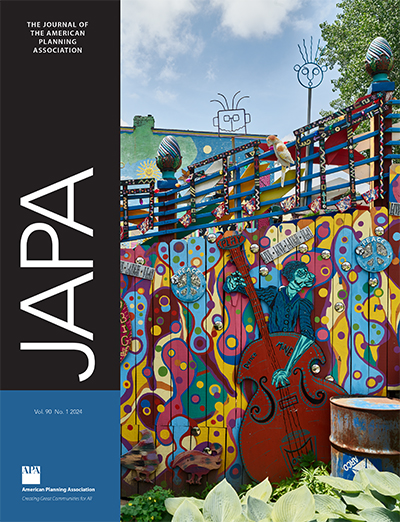将城市热恢复能力作为基础设施问题的必要考虑
IF 3.4
2区 经济学
Q1 REGIONAL & URBAN PLANNING
Journal of the American Planning Association
Pub Date : 2023-10-19
DOI:10.1080/01944363.2023.2259358
引用次数: 0
摘要
将城市热恢复能力概念化为基础设施问题强调了我们必须适应全球气候变化的紧迫性,但也有可能忽视弱势群体因基础设施决策而遭受的持续边缘化。在本观点中,我利用我在建设城市热恢复能力方面的参与式行动研究(PAR)经验,展示了基础设施框架提供机会的方式,以及规划者需要意识到基础设施作为社会技术系统的方式,以及b)认识到社会资本的空间网络,以适当地采取干预措施,使最有可能受到城市气温上升不利影响的人群受益的方式。本文章由计算机程序翻译,如有差异,请以英文原文为准。
Necessary Considerations When Framing Urban Heat Resilience as an Infrastructure Issue
Conceptualizing urban heat resilience as an infrastructure problem emphasizes the urgency with which we must adapt to global climate change, but also risks ignoring the continued marginalization that vulnerable populations experience as a result of infrastructure decisions. In this Viewpoint, I use my experience with participatory action research (PAR) in building urban heat resilience to show the ways in which an infrastructure framing presents opportunities, and the ways in which planners a) need to be aware of infrastructure as socio-technical systems and b) recognize spatial networks of social capital to appropriately approach interventions that benefit those most likely to be adversely affected by rising temperatures in cities.
求助全文
通过发布文献求助,成功后即可免费获取论文全文。
去求助
来源期刊
CiteScore
11.00
自引率
10.70%
发文量
80
期刊介绍:
For more than 70 years, the quarterly Journal of the American Planning Association (JAPA) has published research, commentaries, and book reviews useful to practicing planners, policymakers, scholars, students, and citizens of urban, suburban, and rural areas. JAPA publishes only peer-reviewed, original research and analysis. It aspires to bring insight to planning the future, to air a variety of perspectives, to publish the highest quality work, and to engage readers.

 求助内容:
求助内容: 应助结果提醒方式:
应助结果提醒方式:


